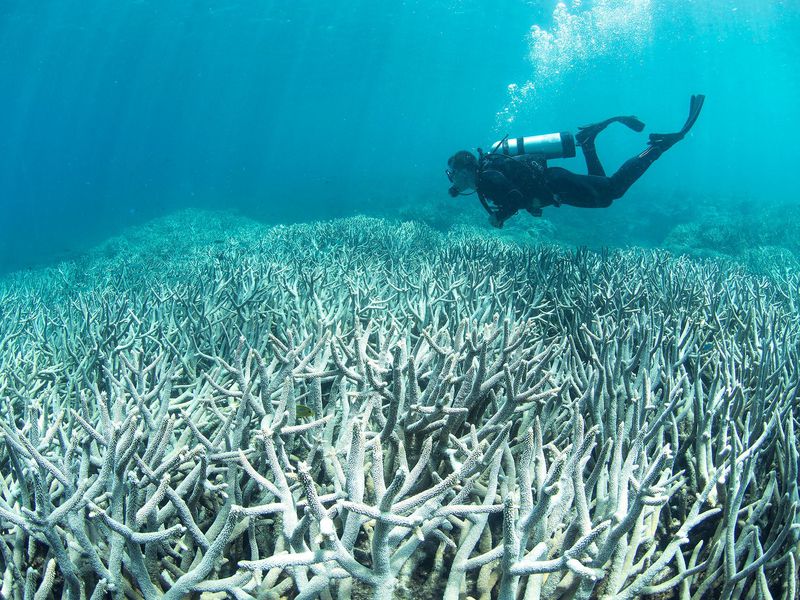A healthy coral reef looks like a vibrant underwater picture, bustling with marine life, but when the heat wave hits, the colorful sea garden fades into a pale graveyard. Worryingly, heatwaves are becoming more common as climate change intensifies.

Amid a pile of gloomy news, however, researchers have found a silver lining: Some corals can recover from bleaching, even in heatwaves. The research team published their findings in Nature Communications.
The researchers focused on Christmas Island (an Australian island) to study the conditions of brain and star corals during heatwaves in 2015-2016. It was the third-largest coral bleaching event on record and lasted 10 months, according to the press release. Donna Lu of New Scientist reports that the team tagged, photographed and tracked individual corals on the island to see how they survived the relentless heatwave.
Beginning in May 2015, water temperatures around the island rose by 1.8 degrees Fahrenheit in two months, causing corals to expel symbiotic algae. Julia Baum, a marine ecologist at the University of Victoria in Canada and an author of the study, told Science: "What's amazing about this study is that some brain corals and star corals are still alive in seawater." Recovers when warm. Prior to this study, researchers had only found corals recovering from bleaching after ocean water cooled, according to the press release.
"Corals recovering from bleaching events while sea temperatures are still high is a game-changer," Baum said. "Even in prolonged heatwaves, some corals have hope of surviving."
Baum and her team found that corals near disturbed areas with high sediment, sewage and pollution were more tolerant of warmer waters before the heat wave hit. In theory, this should mean that these corals are more likely to survive a heatwave, however, brain corals with heat-sensitive algae survived 82 percent of the time, compared to 25 percent of brain corals with heat-tolerant algae.
The study shows that corals are more likely to survive if they are not affected by other stressors such as pollution or overfishing. Coral survival was therefore higher in those more pristine and untouched areas of the study site. However, some scientists previously believed that these factors had no effect on the likelihood of corals surviving a heatwave.
"This research paper clearly shows that this argument is wrong, at least for corals in this area," said Nancy Knowlton, a coral reef biologist at the Smithsonian's National Museum of Natural History who was not involved in the study. "A healthy environment is actually very important for coral survival," Nancy Knowlton told Science.
Heatwave conditions are expected to become more intense and longer lasting as climate change intensifies. The research offers some hope that with protection, corals can better withstand the coming heatwave.
"Understanding how some corals can survive prolonged heatwaves could provide an opportunity to mitigate the impact of marine heatwaves on coral reefs and buy us time to limit greenhouse gas emissions," said a marine scientist at the University of Washington and lead author of the study Danielle Claar said, "While this survival path will not work for all corals under all conditions, it is an innovative survival strategy that conservationists can use to help The coral survived."
Source: web page